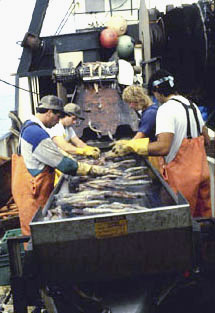10 commandments could save world fisheries
10 commandments could save world fisheries
mongabay.com
February 18, 2007
Global fisheries are in decline. Now a team of scientists have proposed a set of ten commandments to protect the world’s marine fish populations while ensuring ongoing production of sea food in a sustainable manner. They presented their work Sunday at the annual meeting of the American Association for the Advancement of Science in San Francisco.
The commandments:
-
“Keep a perspective that is holistic, precautionary and adaptive” Mark Hixon, a professor of zoology at Oregon State University, explained: “We must consider whole systems, we must fish with more caution, and we must learn by testing new approaches. Instead of talking about ecosystem management, we refer to ‘ecosystem-based’ management, because it’s misguided to think that we can totally understand or completely control entire marine ecosystems.”
-
“Question every assumption, no matter how basic it is or what the conventional wisdom suggests.” Hopkins says that some traditional fishery goals — like “maximum sustainable yield” — are based on flawed concepts.

Image courtesy of NOAA.
-
Maintain an ‘old growth’ structure in fish populations, since big, old, fat, female fish have been shown to be the best spawners, but are also susceptible to overfishing.
-
Characterize and maintain the natural spatial structure of fish stocks, so that management boundaries match natural boundaries in the sea.
-
Monitor and maintain seafloor habitats to make sure fish have food and shelter.
-
Maintain resilient ecosystems which are able to withstand occasional shocks.
-
Identify and maintain critical food-web connections, including predators and forage species.
-
Adapt to ecosystem changes through time, both short-term and on longer cycles of decades or centuries, including global climate change.
-
Account for evolutionary changes caused by fishing, which tends to remove large, older fish.
- Include the actions of humans and their social and economic systems in all ecological equations.
Hixon said that “nowhere in the world are all of these ‘commandments’ being followed perfectly.” He noted that the most progress has been made in the North Pacific Fishery Management Council. Its efforts have produced comparatively healthy fisheries in Alaska
This article is based on a news release from Oregon State University.